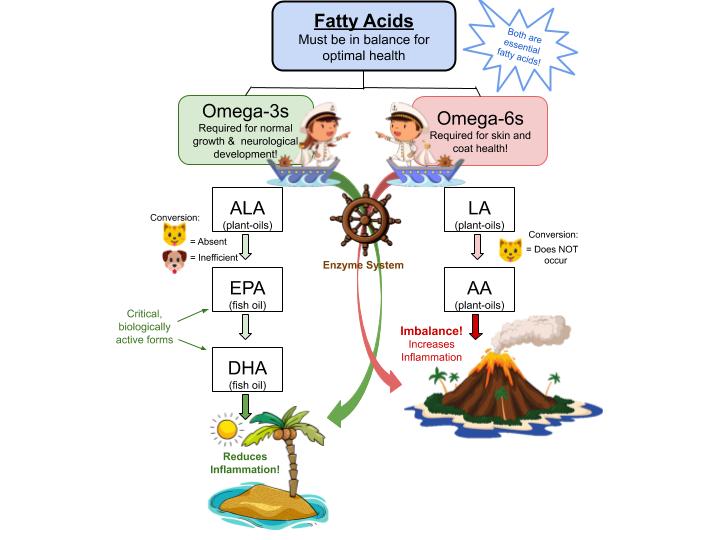Fish oil is a prominent dietary supplement among humans and one we’ve been using for quite some time now. Evidence of its therapeutic use can be dated all the way back to 1783.1 The research supporting its plethora of health claims, from benefiting inflammation to strengthening joints, continues to expand. It has known benefits for us, but what about our furry best friends? Research on fish oil supplementation for both dogs and cats is flourishing, and evidence supports supplementing your pet’s diet with fish oil. However, not all fish oils are created equal! How can you tell the good from the mediocre? Before deciding which is the best fish oil product to give to our pets, it is important to understand what properties within fish oil makes it so beneficial, so you can make an informed purchase. We will also examine the many benefits of fish oil for cats and dogs and the evidence behind these health claims.
| Key Definitions: |
|---|
| PUFAs |
| ω-3 |
| ω-6 |
| ALA |
| EPA |
| DHA |
| LA |
| AA |
| NRC |
What is in fish oil that makes it so special?
Dietary fats, especially fatty acids, are necessary for our furry friends for energy, vitamin absorption, regulation of inflammation, to keep our cells healthy, and for skin and coat health among other things.2 Certain types of fatty acids, including omega-3 and omega-6 polyunsaturated fatty acids (PUFAs), can only be found in our pet’s diet and are thus considered essential.2 Check out Table 1, for a full overview of essential fatty acids and their requirements for dogs and cats.
Table 1: Essential Fatty Acids for Dogs and Cats2****:
Classification | NRC Dietary Requirement (mg/1000kcal) | |
|---|---|---|
| Pregnancy + Puppies | Dogs | Pregnancy + Kittens |
| Linoleic Acid (LA) | Omega-6 | 3300 |
| Arachidonic acid (AA) | Omega-6 | 80 |
| Alpha-linolenic acid (ALA) | Omega-3 | 200 |
| Eicosapentaenoic acid (EPA) + Docosahexaenoic acid (DHA) | EPA: Omega-3 DHA: Omega-3 | Combined EPA + DHA 130 |
The three main omega-3 fatty acids are alpha-linolenic acid (ALA), eicosapentaenoic acid (EPA) and docosahexaenoic acid (DHA). Our pets cannot produce these on their own and must consume them in their diet. These omega-3 fatty acids are essential for normal growth and function, and deficiencies can lead to neurological and nervous system disorders.2,3 Essential omega-6 fatty acids to note are linoleic acid (LA) and arachidonic acid (AA). Dogs are able to create AA from LA, whereas our feline friends cannot, and thus AA is also required in the diet of cats.2 Deficiencies in omega-6s can cause skin and coat issues, as well as reproductive issues.2
When we talk about fish oil, the big thing to note is, we are really talking about omega-3 fatty acids. Specifically, fish oil is a potent source of EPA and DHA.3 While ALA is an omega-3 fatty acid, it is not as important as EPA and DHA, as they are the biologically active forms. ALA, comes from plant-based oils, notably flaxseed oil, rather than fish oil.2 Similarly, omega-6 fatty acids are sourced mainly from vegetable oils.2 Omega-9 fatty acids, a non-essential class of fatty acids can be produced internally by dogs so they don’t have a dietary requirement for them.3 However, they’re still important and beneficial to dogs and additional intake can come from the consumption of vegetable and nut oils, notably olive oil. So, fish oil isn’t the only healthful oil pet owners might consider adding to their pet’s diet.
Looking at Figure 1, you can see ALA is a metabolic precursor of EPA and DHA, while this is true, this conversion is highly inefficient in dogs and essentially absent in cats. Consequently, the National Research Council (NRC) requires dietary intake of both EPA and DHA, which can be met with fish oil.3 Furthermore, Figure 1 displays the omega-6 metabolic pathway, again noting that cats cannot convert LA to AA, and thus have a dietary requirement for it. What is really of note in Figure 1, is the fact that omega-3 and omega-6 fatty acids compete for the same enzyme system. Imagine the enzyme system as a boat, and the omega-3s and omega-6s are competing ship captains, both trying to steer the boat to their destination. The omega-3s destination is an island paradise that produces anti-inflammatory compounds that help reduce and protect against inflammation. However, because of the poor conversion of ALA for dogs and cats, this is true of only of omega-3s EPA and DHA, which come from fish oil. The omega-6s destination, is also a beautiful island, however, on this island, there is a volcano. When consumption of omega-6s are too high, as they commonly are from generic pet food,4 it can erupt and produce proinflammatory damaging compounds that increase inflammation. If both the omega-3s and omega-6s “captains” are using the same “boat” then they’ll have to compete for which island destination they are going to.
Figure 1: Metabolic Pathway of Omega-3 & Omega-6 Fatty Acids:
Supplementing our pets with fish oil, thus increasing consumption of omega-3 fatty acids, means more passengers upon the ship want to go to the omega-3 island paradise, and the omega-3 captain takes control. This subsequently can replace the production of damaging pro-inflammatory compounds with protective anti-inflammatory compounds, as the boat continues to arrive at the omega-3s destination instead of omega-6s.4,5 It is this intricate relationship between omega-3s and omega-6s, that is crucial to understand when discussing fish oil. Finally, beyond their essential roles in growth and function, and because of their ability to reduce inflammation, recent research in domestic animals has revealed important secondary health benefits of EPA and DHA, which is why we might consider giving fish oil as a dietary supplement to our furry friends.
Benefits of Fish Oil for Dogs and Cats
In general, it’s important to note that the therapeutic use of fish oil supplements for treatment of clinical conditions has been studied overall to a greater degree in dogs than in cats.1
Fish Oil Benefits for Skin & Coat
The skin is a large organ that requires many nutrients, including fatty acids, for its maintenance. The imbalance of fatty acids that are pro-inflammatory or anti-inflammatory in the skin cells can contribute to several skin diseases including atopic dermatitis (red itchy allergic skin), flea-bite hypersensitivity, food hypersensitivity, skin allergies, and in cats specifically, miliary dermatitis.6 Consumption of fish oil, in theory, may decrease overall inflammation and improve skin condition.7
Dogs
Evidence supports fish oil supplementation as a potent anti-inflammatory alternative for the treatment of skin diseases in our companion animals. Dogs with skin disease receiving a fish oil capsule for 6 weeks showed significant improvements in skin irritation and itchiness, hair loss, and overall coat quality.1,7 Furthermore, supplementation with EPA + DHA for 10 weeks improved symptoms of canine atopic dermatitis.8
Cats
Diets containing fish oil in cats have also shown success for the treatment of miliary dermatitis, atopic dermatitis, and food hypersensitivity. However, other fatty acids beyond EPA and DHA were included in the diets, so the specific effect of fish oil is inconclusive.1 Further studies have demonstrated that cats fed fish oil showed reduced skin inflammatory responses and increased the levels of EPA and DHA in their skin.9 Additionally, cats with miliary dermatitis supplemented with a combination of evening primrose oil (80%) and fish oil (20%) showed improvements in clinical symptoms.6 Thus, while more research is still required, it is safe to say that fish oil supplementation can improve skin conditions and overall coat health in cats.
Fish Oil Benefits for Joints
Joints allow for function and movement of our skeleton framework while protecting the integrity of the bones by serving as shock absorbers. Disease, trauma, injury, and age can all damage the joint resulting in structural changes, pain, and inflammation. Fish oil’s ability to reduce inflammation makes it a viable treatment option for joint issues in our furry friends.
Dogs
Joint health in dogs can benefit from several dietary supplements, with fish oil being one of them. Dogs are especially prone to osteoarthritis (OA) also known as degenerative joint disease which results in altered mobility.6 Dogs with OA supplemented with fish oil showed improved weight-bearing and clinical signs of arthritis.10 Inflammation plays a huge role in the progression of joint diseases. One study demonstrated that dogs receiving fish oil had a marked reduction in inflammatory markers.11 Furthermore, it has been shown that omega-3 fatty acids reduced inflammatory mediators in the joints of dogs with ruptured cranial cruciate ligaments, a key stabilizing ligament of the canine knee.6
Cats
In cats with degenerative joint disease, a diet containing EPA + DHA showed increased plasma concentrations (amount in blood plasma) and improved mobility. However, this study diet was also supplemented with green-lipped mussel extract and glucosamine-chondroitin sulfate.1 In other studies cats with degenerative joint disease and OA fed a diet containing omega-3s, manganese, and methionine, showed increased mobility, improved ability to jump, reduced stiffness and lameness, and overall reduction in clinical signs of OA.1 So while there are positive indicators, further studies are required to establish fish oil’s exclusive role on joint health in cats.
Fish Oil Benefits for Heart
Heart issues are common in our companion animals, especially as they get older. Approximately 30% of elderly dogs will experience a heart related disease, and in cats, the exact occurrence is not known but is estimated to be less than dogs.6 Symptoms of heart issues in our pets include: fainting, coughing, inability to exercise, heart murmurs, irregular pulse, enlargement of heart, and fluid in the chest or belly.6 Heart diseases are classified as an inflammatory condition, thus fish oil is suspected to benefit heart health in companion animals.12
Dogs
In the United States, heart disease is one of the most frequently occurring diseases among our canine friends.6 Dogs with heart failure have been shown to have decreased plasma levels of EPA and DHA, suggesting a beneficial role of fish oil supplementation.1,6 One study demonstrated that fish oil supplementation in Boxers with right ventricular cardiomyopathy reduced heart arrhythmias.6 Another study in dogs with chronic heart failure demonstrated that fish oil supplementation resulted in the reduction of inflammation and improved strength.1,13 Furthermore, studies have demonstrated that fish oil supplementation in dogs can help reduce irregular heartbeats, increase heart omega-3 PUFA concentrations, reduce the severity of a myocardial infarct (heart attack), and decrease weakness and weight loss associated with heart disease.1
Cats
It is estimated that cardiac disease of some sort affects up to 20% of cats.12 Fish oil supplementation in cats has been shown to benefit the inflammatory components of heart disease, including cardiac cachexia (muscle loss) and loss of appetite.12 It also reduces platelet aggregation, which is suspected to be helpful in cats with heart disease at risk of blood clots.12 However, much research is still required on the direct effects of fish oil supplementation and heart conditions in cats.
Fish Oil Benefits for Kidney
The kidneys, as they do in humans, filter waste products out of the blood and regulate fluid balance in our furry friends. Omega-3s, provided as fish oil, are known in high doses to improve the blood filtration rate in animals with impaired kidney function.6,14
Dogs
Research supports the “renoprotective” effects of fish oil supplementation in dogs. Dogs with renal failure supplemented with fish oil showed decreased blood pressure and improved blood lipid levels.15 In dogs with induced renal failure, supplementation with fish oil improved blood lipid levels and increased renal function.1,6
Cats
Studies in cats are also demonstrating that fish oil supplementation is beneficial to kidney function by decreasing cholesterol and lipid levels, blood pressure, and the production of pro-inflammatory metabolites.1 A diet containing EPA, DHA, and AA showed kidney health benefits in cats by decreasing the risk of urine stone formation, lowering urine calcium concentrations, and improving blood lipid levels.16
Fish Oil Benefits for Eyes & Brain
DHA is highly concentrated in the eyes and brain. Therefore, DHA is essential for the visual and neurological development of kittens and puppies. It is imperative that the mother cat or dog’s milk be rich in fatty acids, especially omega-3s, which can be achieved via diet.6 Fish oil supplementation may be a good way to provide growing puppies and kittens with a source of preformed DHA. However, older cats and dogs can also benefit neurologically from fish oil.
Dogs
Puppies, unlike dogs, have the ability to convert ALA to DHA more efficiently during this period of growth. However, this conversion is still limited, and puppies receiving preformed DHA show improved retinal function, ability to learn a new task, and memory.6 In one study, maternal dogs were initially fed diets containing low, moderate, or high amounts of fish oil, that their puppies were later weaned onto. Puppies on the high fish oil diet showed the greatest improvement in visual performance.14 On the opposite end of things, older dogs can benefit cognitively from fish oil supplementation as well. Dogs receiving a diet containing DHA showed improved aggression and behavioral changes as well as, improved memory and recognition.1
Cats
It is recommended that food designed for kittens provide an external source of DHA, such as fish oil.6 For older cats, one study demonstrated that middle-aged and old cats supplemented with a combination of nutrients, including fish oil, showed improved cognitive function, spatial memory, and reduced risk factors for brain aging.17
Emerging Benefits of Fish Oil
The research supporting fish oil supplementation for the following benefits is still very limited, however, current evidence is showing positive results for dogs and cats.
Gastrointestinal
Gastrointestinal (GI) diseases in dogs and cats are broad and consist of several different disorders. With most GI disorders, diet is very important because of the role the GI tract play in nutrient absorption.6 Inflammatory bowel disorders (IBD), a further class GI disease, may benefit from fish oil supplementation. Treatment of IBD includes the reduction of inflammation, which is where fish oil supplementation comes in. Emerging research is indicating that increasing omega-3 fatty acid intake favors the production of less inflammatory metabolites within the intestine.6
Cancer
Cancer in dogs is usually seen as lymphomas and osteosarcomas, and beneficial effects of fish oil supplementation have been noted in dogs with several forms of cancer, especially colon, breast, and prostate.1 In dogs, concentrations of protein degrading enzymes were found to be high in tumors, fish oil has been shown to decrease levels of these destructive enzymes in dogs, and is thus suspected to be helpful in canine tumor metabolism.1 Dogs with lymphoma supplemented with fish oil had longer survival times, disease-free intervals, as well as increased serum levels of EPA and DHA.18 Mammary gland tumor cells in cats are similar to human breast tumor cells, and fish oil has been shown to benefit these tumor types, and is further suspected to benefit other similar cancers.1
Obesity
In the U.S. between 20-50% of dogs and 25-50% of cats are overweight or obese.6 Obesity can cause inflammation and put our companion animals at risk of other chronic diseases. While caloric restriction is often employed to help mediate the weight loss of our furry friends, certain nutrients like omega-3 fatty acids can be beneficial in this endeavor. For one, fat cells produce pro-inflammatory metabolites, while omega-3s produce less and anti-inflammatory metabolites. Additionally, omega-3s help reduce plasma insulin and aid in glucose control in our pets.6
Safety and Potential Side Effects
While the benefits of fish oil supplements for cats and dogs are obviously vast, there is still the potential for negative side effects that need to be considered.
In dogs and cats with conditions relating to fat and energy imbalances that are instructed to restrict fat intake, supplementing with fish oil may be counterintuitive, as it supplies a source of dietary fat. Further noted potential side effects of fish oil supplementation include: diarrhea, vomiting, decreased platelet aggregation and wound healing, weight gain, altered immune function, pancreatitis (in large doses), and possible drug interactions.2,19 A condition known as “yellow fat disease” is also known to occur in cats with high dietary intake of fats (fish oil) and low vitamin E levels. Supplementation with fish oil can further increase a cat’s need for vitamin E by 3-4 times, which is why fish oil and vitamin E are often given together.6
If your pet experiences side effects from fish oil, an adjustment in their dose or stopping supplementation altogether may be necessary. There are many considerations when choosing a fish oil supplement for your beloved companion, but always make sure to consider your pet’s existing conditions and talk to your vet.
References
- Bauer, J. E. Therapeutic use of fish oils in companion animals. J. Am. Vet. Med. Assoc. 239, 1441–1451 (2011).
- Lenox, C. E. Role of dietary fatty acids in dogs & cats. TVP Journal 83–90 (2016).
- Lenox, C. E. Timely Topics in Nutrition: An overview of fatty acids in companion animal medicine. J. Am. Vet. Med. Assoc. 246, 1198–1202 (2015).
- Kwochka, K. W. Fatty acids in veterinary dermatology and beyond: mechanism of action, clinical indications and quality. in SPONSORS OF THE 8 TH WORLD CONGRESS OF VETERINARY DERMATOLOGY 216 (pdfs.semanticscholar.org, 2016).
- Bauer, J. E. The essential nature of dietary omega-3 fatty acids in dogs. J. Am. Vet. Med. Assoc. 249, 1267–1272 (2016).
- Linda P. Case, Leighann Daristotle, Michael G. Hayek, Melody Foess Raasch. Nutrition and the Heart. in Canine and Feline Nutrition - A Resource for Companion Animal Professionals 3, 511–519 (Mosby Elsevier, 2011).
- Logas, D. & Kunkle, G. A. Double-blinded Crossover Study with Marine Oil Supplementation Containing High-dose icosapentaenoic Acid for the Treatment of Canine Pruritic Skin Disease. Vet. Dermatol. 5, 99–104 (1994).
- Mueller, R. S. et al. Effect of omega-3 fatty acids on canine atopic dermatitis. J. Small Anim. Pract. 45, 293–297 (2004).
- Park, H. J., Park, J. S., Hayek, M. G., Reinhart, G. A. & Chew, B. P. Dietary fish oil and flaxseed oil suppress inflammation and immunity in cats. Vet. Immunol. Immunopathol. 141, 301–306 (2011).
- Roush, J. K. et al. Evaluation of the effects of dietary supplementation with fish oil omega-3 fatty acids on weight bearing in dogs with osteoarthritis. J. Am. Vet. Med. Assoc. 236, 67–73 (2010).
- Hansen, R. A. et al. Fish oil decreases matrix metalloproteinases in knee synovia of dogs with inflammatory joint disease. J. Nutr. Biochem. 19, 101–108 (2008).
- Freeman, L. M. Beneficial effects of omega-3 fatty acids in cardiovascular disease. J. Small Anim. Pract. 51, 462–470 (2010).
- Freeman, L. M. et al. Nutritional alterations and the effect of fish oil supplementation in dogs with heart failure. J. Vet. Intern. Med. 12, 440–448 (1998).
- Bauer, J. E. Responses of dogs to dietary omega-3 fatty acids. J. Am. Vet. Med. Assoc. 231, 1657–1661 (2007).
- Neumayer, H.-H. et al. Amelioration of lschemic Acute Renal Failure By Dietary Fish Oil Administration in Conscious Dogs. Journal of the American Society of Nephrology 3, 1312–1320 (1992).
- Hall, J. A., Brockman, J. A., Davidson, S. J., MacLeay, J. M. & Jewell, D. E. Increased dietary long-chain polyunsaturated fatty acids alter serum fatty acid concentrations and lower risk of urine stone formation in cats. PLoS One 12, e0187133 (2017).
- Pan, Y. et al. Cognitive enhancement in middle-aged and old cats with dietary supplementation with a nutrient blend containing fish oil, B vitamins, antioxidants and arginine. Br. J. Nutr. 110, 40–49 (2013).
- Ogilvie, G. K. et al. Effect of fish oil, arginine, and doxorubicin chemotherapy on remission and survival time for dogs with lymphoma: a double-blind, randomized placebo-controlled study. Cancer: Interdisciplinary International Journal of the American Cancer Society 88, 1916–1928 (2000).
- Lenox, C. E. & Bauer, J. E. Potential adverse effects of omega-3 fatty acids in dogs and cats. J. Vet. Intern. Med. 27, 217–226 (2013).



